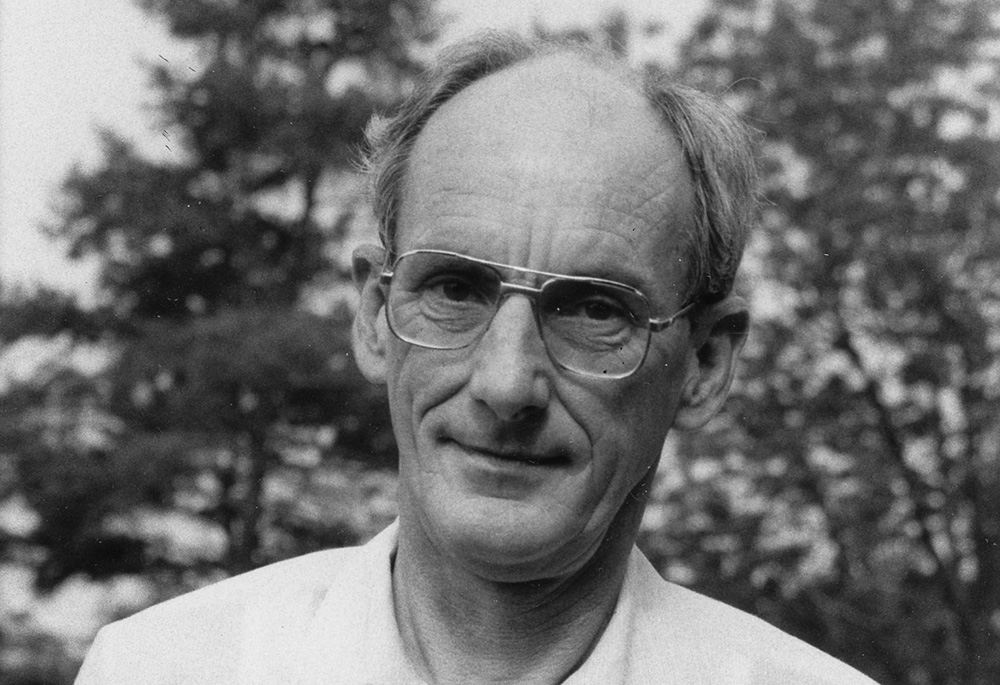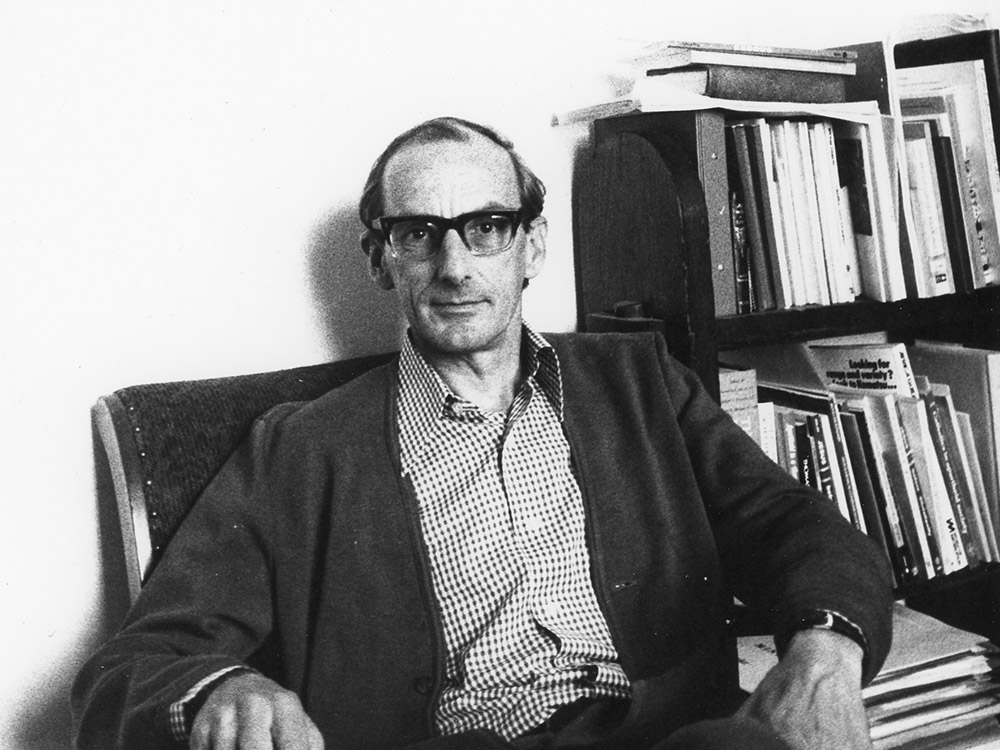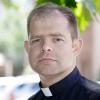
South African theologian and anti-apartheid activist Dominican Fr. Albert Nolan, seen here in an undated photo, died Oct. 17 at age 88. (NCR photo/Mev Puleo)
One of South Africa's most well-known Catholic anti-apartheid activists, theologians and authors, Dominican Fr. Albert Nolan, died Oct. 17. Nolan, the author of Jesus Before Christianity, was 88.
Nolan was provincial of the Dominicans in South Africa from 1976 to 1980. In 1983, he was elected master general of the Dominican Order. However, he turned this down, convincing his confreres that it was more important for him to stay in South Africa and work in the struggle against the country's apartheid regime.
On hearing of his passing, Cardinal Wilfrid Napier — South Africa's only cardinal — called Nolan a "wonderful servant of God" on Twitter. Napier said he had served the Dominicans, South Africa and the world community of believers and nonbelievers.
Convinced that we must do theology from the grassroots, Nolan was a founding member of the Institute for Contextual Theology in South Africa. He was adamant that theological reflection must be accessible to ordinary people.
He played a crucial role in drafting the so-called Kairos Document in 1985 when he worked with an ecumenical group of mainly Black theologians from Soweto on the outskirts of Johannesburg.
The apartheid government tried to justify racism theologically and was becoming more oppressive and draconian in its use of force against those who opposed its policies. The Kairos Document challenged any theological foundation for racial discrimination.
The document evoked strong reactions and debate within the church in South Africa and abroad. It challenged the church's response to the government and marked a key moment in the church and the country. However, it also put those who worked on it at risk, as the apartheid regime did not take kindly to critique. It would harass, arrest and torture anyone who opposed it.
Fellow Dominican Fr. Martin Badenhorst said, "Albert was at his best as one who heard the cry of Black experience and encouraged the articulation of that cry so that it would be heard and respected everywhere."
Nolan was born in Cape Town, South Africa, in 1934. He entered the Dominicans in 1954 after reading the works of Thomas Merton, which inspired him and attracted him to religious life.
He studied in both South Africa and Rome. His time in Rome coincided with the period of the Second Vatican Council. Throughout his life, he shared and lived the vision the council had of the church and the world.
Advertisement
In a sermon Nolan preached on the occasion of his and fellow Dominican Fr. Gregory Brooke's golden jubilee of ordination in 2011, Nolan recalled how the council was a source of great joy and hope. He said that he and his confreres were wildly excited by it and bubbling over with hope for the future. They believed that, finally, the church was changing, catching up with the modern world beyond their expectations.
In the same sermon, he also lamented how the gains of Vatican II were gradually being reversed.
Nolan thought that Pope Paul VI's encyclical Humanae Vitae — which reaffirmed the ban on the contraceptive pill — was the beginning of this reversal. It was, Nolan said, a disappointment.
He also spoke of how he felt collegiality was undermined by the appointment of conservative bishops and how the liturgical reforms, too, were subtly being reversed.
He concluded by saying that he would continue calling himself part of the Gaudium et Spes generation — the generation of joy and hope — who could, at least, sow a few seeds for spiritual and intellectual renewal.
In 1972, Nolan published Jesus Before Christianity, in which he examined how Jesus identified with the poor and oppressed and was radically involved in the struggle to recognize the full humanity of all. The book is still in print and has been translated into nine languages. It is considered an important contribution to the theology of liberation.
During his life, Nolan not only served as provincial of his order but also as novice master and student master. A good part of his life he dedicated to working with young people.
Nolan was the national chaplain to the National Confederation of Students in South Africa — affiliated with the International Movement of Catholic Students. He made a lasting impression on the students he accompanied and inspired many to get socially involved in the struggle against apartheid.

Dominican Fr. Albert Nolan in 1983 (NCR file photo)
In the dark years of violence and state repression, Nolan offered a message of hope. He believed in the Gospel vision of a non-racial, non-sexist and prosperous South Africa. Nolan was a gentle and kind man yet forceful in his convictions and faith-inspired vision. He had a prophetic vision greater than many of his contemporaries.
In 1988, Nolan was forced to go underground to hide from the apartheid security forces. During this time, he published his second major work, God in South Africa, which was lauded as a wonderful example of contextual theology.
In 2006, Nolan's book Jesus Today: A Spirituality of Radical Freedom, which explores Jesus' own freedom and the freedom he challenges his followers to, was published.
In the 1990s, Nolan started an ecumenical magazine, Challenge — described by some as "radical" — which he edited for several years. The magazine was born out of his conviction that theology must be done from the grassroots. It examined how Christians should respond to what was happening in South Africa, and addressed issues toward the end of apartheid and after the birth of democracy.
Through his writing, teaching and accompaniment of others, Nolan sought to help people find inspiration and transformation in the Scriptures. His work for justice came from his deep reflection on the Gospels, prayer and spirituality.
He was often invited to speak around the country and the world. Small in stature, he was a theological giant in South Africa and respected in wide theological circles.
He was close to well-known South African Archbishop Denis Hurley, who had been indicted for treason by the apartheid government for accusing it of atrocities in South West Africa — now Namibia.
Nolan also was united in the struggle for democracy with other anti-apartheid Christian leaders, such as Anglican Archbishop Desmond Tutu, the Rev. Frank Chikane of the Apostolic Faith Mission, and the Rev. Beyers Naudé of the Dutch Reformed Church in Africa.
After hearing of his death, Chikane said: "Albert Nolan was a gift of God to us. He enriched our engagement and [the] development of our theology in a conflict situation because that's what we were dealing with."
Nolan was also often called on by the Southern African Bishops' Conference to offer theological input at meetings and conferences. Although there was tension between him and some of the bishops for his critique of the Catholic Church and its leadership, he remained a respected figure in Catholic circles.
In 1990, the Holy See would not allow the University of Fribourg in Switzerland to give him an honorary doctorate. It is unclear why the Vatican took this stance; some believe it was because of his commitment to liberation theology. However, the same year, the Jesuit-run college at the University of Toronto, Regis, bestowed an honorary doctorate on him.
In 2008, Fr. Carlos Azpiroz Costa, the master of the Dominicans, promoted him to a Master of Sacred Theology in recognition of his contribution to theology.
Nolan supported the work of activists and liberation movements. He accompanied many who were victims of the apartheid state's security forces. He courageously supported the African National Congress — now South Africa's ruling party — in its struggle for liberation.
Lifelong friend and colleague Redemptorist Fr. Larry Kaufmann worked with Nolan at the Institute for Contextual Theology, said that Nolan was a "friend, mentor, inspiration, prophet, teacher."
Kaufmann recounts that he once heard Tutu describe Nolan as a "theological stalwart of the struggle against apartheid."
"Albert harnessed all his theological acumen in the service of the poor, the marginalized and the oppressed," Kaufmann said.
Nolan was, for many, a man who lived the Gospel and, in doing so, inspired those around him. He wanted the Gospel to be a tangible lived reality.
Nolan healed those broken and sick and fed the hungry. He believed in and witnessed to a God who liberates from any form of oppression.
South Africa has lost one of its greatest theologians, a man who was not only a leader but had immense moral courage. Yet, as Kaufmann says, "his prophetic message lives on, not only in his writing but in the poor who still clamor for justice."







